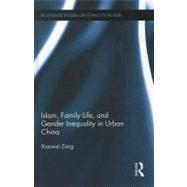
Note: Supplemental materials are not guaranteed with Rental or Used book purchases.
Purchase Benefits
What is included with this book?
| List of figures and tables | p. viii |
| Preface | p. x |
| Acknowledgements | p. xiv |
| Between Islamic affiliation and gender inequality | p. 1 |
| Five aspects of gender inequality | p. 2 |
| Possible mechanisms of sexual stratification | p. 2 |
| Religiosity as a mechanism of gender inequality | p. 6 |
| Family processes as a mechanism of gender inequality | p. 10 |
| Changes and persistence in family life among Uyghurs | p. 11 |
| How do family processes affect gender inequality? | p. 15 |
| Do family processes matter? | p. 21 |
| Historical contexts and research design | p. 24 |
| Xinjiang and Ürümchi | p. 24 |
| The demographic history of Uyghurs and Han Chinese in Xinjiang | p. 27 |
| Islam in Xinjiang | p. 33 |
| Fieldwork in Ürümchi | p. 36 |
| Analytic methods | p. 39 |
| Dependent variables | p. 39 |
| Independent variables | p. 40 |
| A hard choice: to work or not to work? | p. 48 |
| Gender gaps in employment in China | p. 50 |
| Muslim women's labour supply | p. 51 |
| Field observations in Ürümchi | p. 53 |
| Why are women less likely than men to be employed? | p. 57 |
| Is religion related to female labour-force participation? | p. 62 |
| Religiosity and Muslim women's labour supply | p. 64 |
| Does religiosity affect gender inequality in work in Ürümchi? | p. 64 |
| Do family processes affect women's market behaviour? | p. 68 |
| Family processes and gender inequality in employment in Ürümchi | p. 71 |
| Supplementary analyses | p. 75 |
| Why do Uyghur men earn more than Uyghur women? | p. 77 |
| The gender earnings gap in China | p. 78 |
| Gender earnings gaps among Uyghurs | p. 79 |
| Why do women earn less than men? | p. 81 |
| Is religious affiliation related to earnings? | p. 85 |
| Religiosity and gender inequality in income | p. 85 |
| Religiosity and Uyghur women's earnings | p. 87 |
| Family processes as a determinant of earnings | p. 89 |
| Family processes and gender inequality in income | p. 91 |
| Supplementary analyses | p. 93 |
| Who does household chores? | p. 95 |
| Why are gendered divisions of household chores important? | p. 95 |
| How are household tasks measured? | p. 97 |
| Gender inequality in housework among Uyghurs | p. 99 |
| How can gendered divisions of household chores be explained? | p. 106 |
| Religiosity and the allocation of household chores | p. 109 |
| Religiosity and housework among Uyghur couples | p. 110 |
| Family processes and housework among Uyghurs | p. 115 |
| Supplementary analyses | p. 120 |
| Who manages the household? | p. 122 |
| Why must household management be studied? | p. 123 |
| How is household management measured? | p. 124 |
| Gender and household management | p. 125 |
| The gendered division of household management in Ürümchi | p. 126 |
| Possible accounts of the gendered division of household management | p. 134 |
| Religiosity and household management | p. 135 |
| Family processes and household management | p. 140 |
| Supplementary analyses | p. 144 |
| Who's the boss? | p. 146 |
| What is family power? | p. 146 |
| The distribution of family power among Uyghurs | p. 148 |
| Relative resources and gender inequality in domestic power | p. 152 |
| Gender ideology and family power | p. 156 |
| Islamic affiliation and family power | p. 157 |
| Religiosity and family power in Urumchi | p. 158 |
| Family work and spousal power | p. 161 |
| Family processes and domestic power | p. 165 |
| Supplementary analyses | p. 169 |
| All in the family | p. 172 |
| Gender inequalities and parities among Uyghurs | p. 172 |
| Why is religiosity a weak mechanism of gender inequality? | p. 174 |
| Why are family processes a major mechanism of gender inequality? | p. 177 |
| Policy implications | p. 179 |
| Notes | p. 181 |
| References | p. 209 |
| Index | p. 229 |
| Table of Contents provided by Ingram. All Rights Reserved. |
The New copy of this book will include any supplemental materials advertised. Please check the title of the book to determine if it should include any access cards, study guides, lab manuals, CDs, etc.
The Used, Rental and eBook copies of this book are not guaranteed to include any supplemental materials. Typically, only the book itself is included. This is true even if the title states it includes any access cards, study guides, lab manuals, CDs, etc.